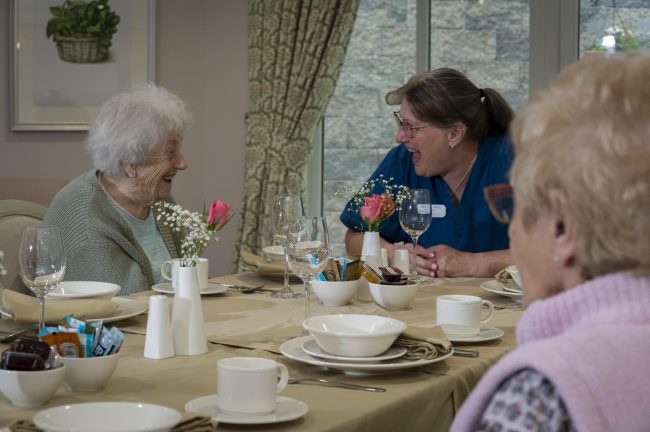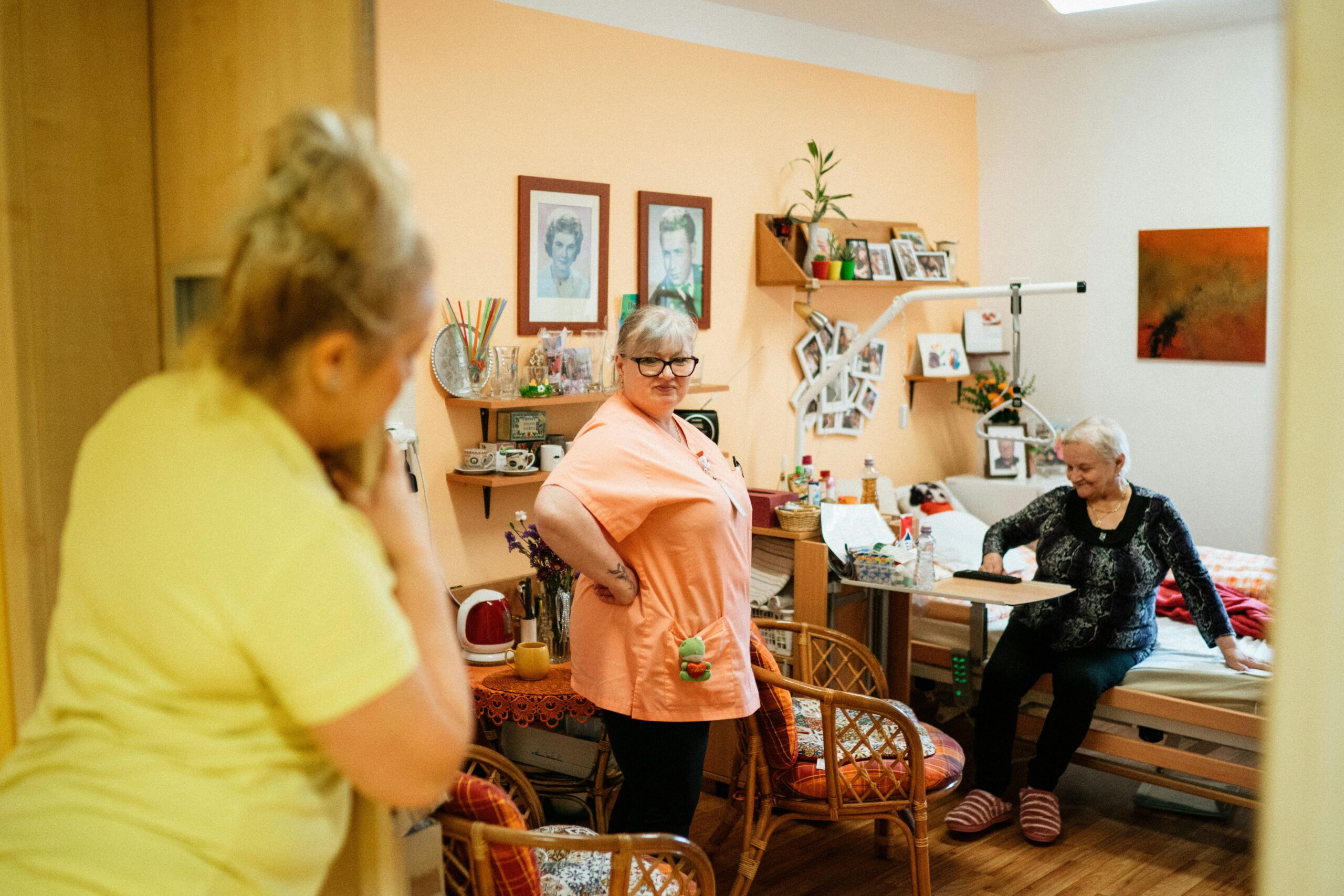Residents from Meadows Park Care Home Enjoy Uplifting Day at The Potting Shed
Residents from Meadows Park Care Home, Louth enjoyed a wonderful day out...
Learn more
29 July 2025
Dementia is a complex condition that affects millions worldwide, presenting unique challenges for individuals, their families, and caregivers. A person-centred care approach offers a compassionate and tailored way to support those living with dementia, focusing on the individual rather than the diagnosis. This article explores how this approach views dementia and its transformative impact on dementia care delivery.
Person-centred care is a transformative philosophy in dementia support, shifting the focus from managing symptoms to celebrating the lives of individuals. Developed by Professor Tom Kitwood in the 1980s, this approach challenges traditional medical models by prioritising personal experiences, dignity, and well-being over disease symptoms. It recognises that people with dementia are not defined by their condition but are unique individuals with rich histories, preferences, and emotional needs.
At its core, person-centred care involves tailoring support to each individual’s interests, abilities, history, and personality. This means understanding their personal history, lifestyle, culture, and preferences, including likes, dislikes, hobbies, and interests. By doing so, care providers can create a supportive environment that respects and values who the person is now and who they have been throughout their life.
By embracing these principles, person-centred care helps manage challenging behaviours, improves emotional well-being, and enhances the overall quality of life for those living with dementia. It is an approach that not only supports individuals but also empowers caregivers to deliver compassionate and effective care.

Person-centred care offers a profound shift in how dementia is perceived and addressed. Rather than focusing solely on the cognitive decline associated with dementia, this approach views the condition as a unique experience for each individual. It reframes dementia as a journey influenced by personal identity, relationships, and environment, rather than solely by the symptoms of the disease.
In this perspective, dementia is not just a medical condition but a complex interplay of factors that shape an individual’s life. It acknowledges that people with dementia are not defined by their diagnosis but are multifaceted individuals with rich personal histories, emotional needs, and ongoing aspirations. By understanding and respecting these aspects, caregivers can provide support that is both empathetic and effective.
This approach seeks to maintain the person’s sense of self and autonomy, even as dementia presents its challenges. It recognises that individuals with dementia continue to have hopes, fears, and desires, and that these should be respected and supported. By focusing on personal identity and experiences, person-centred care helps individuals retain their dignity and sense of purpose.
Relationships and environment play a crucial role in shaping the experience of dementia. Positive interactions with family, friends, and caregivers can enhance emotional well-being and provide a sense of belonging. Similarly, a supportive environment that is familiar and comfortable can reduce confusion and anxiety, creating a more stable and reassuring space for individuals to live and thrive.

Tom Kitwood’s pioneering work in dementia care introduced the concept of the “Flower of Psychological Needs,” which outlines six fundamental psychological needs essential for the well-being of individuals living with dementia. These needs are comfort, attachment, inclusion, occupation, identity, and love. Meeting these needs is crucial for fostering emotional well-being and ensuring that individuals feel valued and secure.
Meeting these psychological needs has a profound impact on the lives of individuals with dementia. It enhances their emotional well-being, fosters a sense of personal control and empowerment, and improves both physical and psychological health.
Adopting a person-centred approach in dementia care yields profound benefits for both individuals living with dementia and their caregivers. This compassionate method not only enhances the quality of life but also fosters emotional well-being, reduces challenging behaviours, and empowers independence.
Person-centred care significantly enhances the quality of life for individuals with dementia by tailoring activities and interactions to their unique interests and abilities. This approach helps individuals engage in meaningful experiences, which in turn reduces agitation, depression, and neuropsychiatric symptoms. By focusing on what brings joy and fulfilment, caregivers can create environments that are both stimulating and calming, leading to a more peaceful and satisfying life for residents.
By prioritising personal preferences and values, person-centred care nurtures a sense of identity and self-worth. This approach respects the individual’s life history, personality, and emotional needs, ensuring that they feel valued and understood. As caregivers acknowledge and support these aspects, residents experience improved emotional well-being, reduced stress, and enhanced trust in their caregivers.
Understanding the triggers for challenging behaviours such as anxiety or aggression is crucial in person-centred care. By identifying these triggers, caregivers can respond empathetically, creating a calmer environment that minimises distress. This approach encourages positive behaviour support, where caregivers work to eliminate or reduce stressors, leading to fewer instances of agitation and aggression.
Encouraging autonomy in daily decisions is a cornerstone of person-centred care. By allowing individuals to make choices about their daily routines, activities, and care, caregivers help maintain a sense of control over one’s life. This empowerment not only enhances self-esteem but also reduces feelings of helplessness and frustration, contributing to a higher quality of life for individuals with dementia.

At Tanglewood Care Homes, these principles are embedded in daily practices to ensure residents feel valued and supported. From personalised care plans to fostering meaningful connections, every effort is made to create a nurturing environment for those living with dementia.
Person-centred care is not just a philosophy; it requires tangible, actionable strategies to ensure its effectiveness. At Tanglewood Care Homes, these strategies are seamlessly integrated into daily practices, creating a nurturing and empowering environment for residents living with dementia. Below are specific examples of how Tanglewood implements person-centred care:
Tailored Activities
Tanglewood offers an extensive range of activities designed to engage residents based on their interests and abilities. These include armchair exercises, flower arranging, carpet bowls, and model making – all of which stimulate cognitive skills while fostering joy and social interaction. For residents with a passion for reminiscing, Tanglewood incorporates reminiscence therapy using photographs, music, or familiar objects to evoke positive memories and emotional connections. The Oomph On Demand platform further enhances this by providing tailored activities such as chair yoga and virtual tours, allowing residents to engage independently or with minimal support.
Life Story Work
Life story work is a cornerstone of person-centred dementia care at Tanglewood. Upon admission, residents are encouraged to share their personal histories, achievements, preferences, and key life moments. This information is used to create a personalised “life story book,” which serves as a guide for caregivers to develop tailored care plans and meaningful activities. For example, a resident who once enjoyed gardening might be invited to participate in planting flowers or tending to the home’s garden spaces. By honouring individual histories, Tanglewood ensures that care is both relevant and deeply personal.
Environmental Adjustments
Creating a safe and familiar environment is essential in dementia care. At Tanglewood, living spaces are personalised with items such as photographs or mementos that reflect each resident’s identity and history. Clear signage and colour-coded designs help residents navigate their surroundings independently, reducing confusion and anxiety. Additionally, calming sensory elements – such as soothing lighting and quiet spaces – are incorporated to promote emotional well-being. These thoughtful adjustments ensure that residents feel secure while maintaining their dignity and independence.
Caregiver Training
Empathy-driven communication is central to person-centred care at Tanglewood. All team members receive specialised training in dementia care, equipping them with the skills needed to understand the unique needs of each resident. Caregivers learn how to identify triggers for distress and respond compassionately, fostering trust and reducing challenging behaviours such as agitation or aggression. Daily interactions focus on building meaningful connections that help residents feel valued and supported.
Tanglewood’s Commitment to Excellence
At Tanglewood Care Homes, person-centred care is an ethos embedded in every aspect of service delivery. Monthly meetings with residents ensure their voices are heard when planning activities or adjusting care plans. Group activities like gardening clubs or dancing sessions encourage social interaction and foster a sense of community among residents. For families seeking temporary support, Tanglewood’s day care services provide structured activities that promote well-being while offering respite for caregivers.
From personalised care plans to tailored activities and thoughtfully designed environments, Tanglewood Care Homes exemplifies the best practices in person-centred dementia care. By prioritising individuality, independence, and emotional well-being, Tanglewood creates a space where residents can thrive through an unwavering commitment to compassionate care.
To learn more about Tanglewood Care Homes or to arrange a visit to one of our care homes, please call us on 01205 358888 or email us at info@twhealthcare.co.uk.